Episode 8
Finding Our Voices
S02 - Episode 8
December 21, 2024
47 mins & 40 secs
Speakers
Chris McLaughlin
Soren Peterson
About
We all are striving to find our voice. Chris and Soren discuss effective strategies for advocating and standing up for causes you believe in. This episode offers practical advice on how to find and use your voice to effect change, regardless of your age. Discover the challenges and rewards of advocacy, and how to maintain resilience and passion in the face of adversity.
https://www.youtube.com/@InspiredInsightsPodcast
inspiredinsights@inspiredcg.com
*Please note that this episode contains sensitive behavioral health topics such as suicide and substance use. If you are experiencing a behavioral health crisis, please contact the 988 Suicide & Crisis Lifeline by calling 988 or visiting www.988lifeline.org.
**This podcast is for information and entertainment purposes only and should not be considered health advice. This podcast is not intended to replace professional medical advice.
Transcript
The Inspired Insights podcast is for informational and entertainment purposes only and should not be considered health advice. This podcast is not intended to replace professional medical advice.
Please note that this podcast may contain discussions on sensitive topics such as mental illness, suicide and substance use. If you are experiencing a behavioral health crisis or need support, please contact the 988 Suicide and Crisis Lifeline by calling 988 or visiting www.988lifeline.org.
Soren:
Hi, I’m Sorin.
Chris:
Sorin! I feel like I have to start every episode screaming Sorin!
Hi Sorin, welcome back. Uh-huh. Next episode of the Inspired Insights podcast, I’m Chris McGloin.
Soren:
I’m Sorin Peterson.
Chris:
What have you been up to lately?
Soren:
Uh, you know, it’s been summer. I’ve been liberated out on the town and such. I’ve been doing a few public speaking gigs of late.
Chris:
Oh, that’s right. Yeah, you’ve been doing like a speaker’s tour.
Soren:
I wouldn’t say a speaker’s tour.
I’ve been going to some relatively small speaking things for our local hospital.
Chris:
Yep.
Soren:
And I found it super rewarding.
Chris:
Oh, I want to talk about this. Let’s start with what has been your Inspired Insight of the week?
Soren:
So my Inspired Insight is involved with public speaking. And it is how rewarding it can be to both feel like you’re advocating for a cause that you believe in and feel like you’re being heard. I have found it incredibly rewarding to share my experiences publicly and my insights and, like, feel like I’m making a change.
And I think that’s something super innate in humans. We need to feel like we are being useful and creating progress. And through my, like, advocacy work, I’ve been getting that positive emotion.
Chris:
That’s so cool. That’s so cool. We’re going to talk about this.
We’re going to break this way down. My Inspired Insight for the week has been something, it was a meme that I saw floating around the Instabooks. And it essentially says that your greatest test as a human will be how you handle the people who have mishandled you.
Really speaking to me about this idea of how when they go low, we go high and rising above the criticism and the noise and learning to forgive.
Soren:
Yeah. And we did a whole episode on handling criticism. And I feel like the way that we interact with those who are spewing negativity at us says less about them and more about us.
Chris:
You are spot on.
Soren:
Like, the way that we react to stimuli is a comment on us rather than a comment on the stimuli, I feel.
Chris:
It’s been interesting and you and I have talked about this off air. It’s been interesting as season one is out there and folks are starting to respond to it and we’re starting to get some feedback and some questions. And people want to learn more.
It’s been interesting. Interesting might not even be the word. Because of some of my experiences that we talked about last season with criticism in my work on a school board in my town and being just kind of a very, very vocal and visible advocate for queer youth and the families who love them.
I’ve been waiting for this other shoe to drop sort. Like so far, we’re hearing so much cool stuff about the Inspired Insights podcast. People are reaching out, letting us know that it inspired conversation in their house, that they found some nuggets to take back to the school or to the patient experience rooms.
And I’ve been I’m feeling myself waiting for that other shoe to drop. And it hasn’t dropped yet. But I feel like I’ve been conditioned to expect it now.
Soren:
Yeah. I think I have a sort of blind optimism approach to it. I feel like to some extent, and I noticed this public speaking, the audiences I was addressing wholeheartedly agreed with everything that I was saying, and were prone to respond positively to it.
And I think the audiences that we are reaching with this podcast as of right now, in its early stages, are primarily people that will respond positively to it.
Chris:
They’re choosing to listen for all the right reasons, all the reasons we want them to. Yeah. To your point, you’ve done more than a handful of some public speaking events of late, and I’ve been able to listen to a couple of them or be part of a couple of them with you.
And you’re right. Folks are there for a reason. They’re there with curious minds, looking to learn, and really turning to you for your lived experience, your lived perspective, as somebody who’s experienced various kinds of health care, whether that’s behavioral health or even primary care.
And they’re looking for you to help teach them how to do this differently. And maybe in that doing it differently, we can find better. Yeah.
Soren:
And I think it’s so, it’s very important for health care providers to listen to patients for feedback. But I think it’s so, A, it’s a fantastic opportunity. And B, I feel like unworthy to step up and critique these medical professionals on what they’ve been educated in.
I don’t feel like I’m really in a position to do that. I’m not esteemed enough. And yet, I’m one of the few that are willing to speak publicly on it.
Chris:
That’s right. Let me give you an analogy. And it’s one of my favorite analogies to use when I talk about feedback in health care or feedback in some of these really nuanced fields.
When you go out to eat and you order something on the menu, you’re ordering it because you have a, it’s going to be a new restaurant, a restaurant you’ve never been to, right? And you order something on the menu because you think you’re going to like it. You have a sense of what’s going to come in front of you.
You have a sense of the ingredients, maybe the flavor profile. You might not know how to cook it, but you have a sense of what you’re expecting. And then they bring that plate out and they set it in front of you and they take the top off and go, ta-da!
And it looks like complete dog food. And you smell it and it smells like dog food. And you taste it.
And I’ve not eaten dog food, but we have this imagination of what dog food might taste like. And it tastes like complete dog food. You’re no chef.
You’re not an expert in culinary arts, but you still know what you like and you still know what you’ve come to expect. You don’t have to give the chef feedback on do more of this, less of this, add this, subtract this. But the feedback is, this was dog food.
Never make this again. So that analogy for me is you don’t have to be a Michelin star chef to be able to give feedback on what the experience of eating the food was like. Yeah.
And that’s how I view you as the healthcare advocate.
Soren:
Um, I really liked that analogy. And like, I do a little home cooking on my own.
Chris:
And I’m using that.
I was mostly taught because I do know you cook. So I realized that as I was using this analogy, I was like, dang, Soren’s gonna beat up on me because Soren does like to cook. But you get the direction of the analogy.
Soren:
I totally get that. And I think like, we can’t always go to a restaurant. We need to be home chefs for ourselves.
Chris:
That’s right.
And the point of the analogy, my friend, was you can give feedback on something without being the expert. And so I know when you’ve been doing these, um, this public speaking, you’ve gone into it and left with who the heck am I to be telling Dr. So-and-so what to do differently. And my challenge for all of us is to think about we don’t have to be the expert to give our experience on the perspective.
Yeah. How did this feel? How did that, did it land?
Did it not land? And some of your advocacy, especially lately, has been talking about what worked in your experience and what didn’t work.
Soren:
Yeah. Like the other day, I got the opportunity to speak on a panel with three other mental health professionals, specifically in the gender affirming care space. And I was quite intimidated by it at first, but I think that I still managed to provide very valuable insights that were specific to my viewpoint and also broadly applicable.
And I think a lot of kids are afraid of sharing their viewpoints because for our entire lives, we’ve been dismissed because we’re kids. We don’t know anything about anything. But I think in a number of spaces, our viewpoints are even more important than adults or experts to some extent.
Chris:
Yeah. Well, it makes sense to me, especially talking about pediatrics, or in this case, aspects of gender affirming care or mental health treatment. It only makes sense to me, and this is part of my philosophy of care as a social worker and as a provider.
I want to ask the people who receive my services how it felt in order to get the best feedback. Just because the textbooks say this is the way to deliver this service or this care, doesn’t mean it’s going to land with especially some nuanced, unique populations.
Soren:
Yeah. I think it’s super difficult to engage with an evidence-based approach in psychology simply because people are so mentally diverse. And it’s very difficult to have a one-size-fits-all.
In psychology, we use diagnoses to put people in boxes and tailor their treatment based on the box that they fit into rather than them as individuals. And I don’t think that that’s a productive approach, but it’s the easiest.
Chris:
It’s the easiest. And one of the things I’ve heard you say in some of the speaking that you’ve done of the education that you’ve been providing is one of the things that you wish in your experience was that your provider built a relationship with you first, got to know you a little bit better before they slammed you in a box and moved you down the conveyor belt.
Soren:
Yeah.
Chris:
That it’s such a deeply personal experience to receive behavioral health or mental health care that one thing a provider might do differently is actually take the time to get to know you a little bit as a human.
Soren:
Yeah. And I don’t feel like my voice was heard a lot when I was receiving treatment, so now I’m getting loud. You are.
Through advocacy, I am making my voice heard and it’s something super liberating. And I think that kids should be getting loud about issues that they care about a lot more than they are. And actually, one thing about the advocacy that I have been engaging with that I find to be somewhat perturbing is like the people who are there are prone to engage with these things and heard similar things before.
So it’s kind of like an echo chamber. I don’t feel like I’m reaching new people or bringing new ideas to people. I feel like I’m bringing up the same ideas with a different tint to the same people.
Chris:
Yeah. Right.
Yeah. That’s, I think, an age-old conundrum in doing provider education. You’ve helped me.
You and some of your friends, actually, helped me develop a curriculum for LGBTQ plus affirming behavioral health care. And so the folks that take my courses, my trainings, aren’t forced to be there, right? They’re self-selecting into this.
And so they, on day one, are open and receptive to this kind of feedback. They’re not the folks that I’m worried about in this space. I’m worried about the folks who are opting out of this kind of education, who are a little bit more closed off to receiving feedback on to put some of that ego aside.
You know, in the school setting, I am, anybody that knows me knows that one of my soapboxes in education is it’s great to teach teachers and it’s great to teach principals and school social workers and guidance and nursing. I’m more worried about the bus drivers. I’m more worried about the dietary staff, the folks working in the cafeteria.
I’m more worried about the maintenance of the janitorial staff, the folks that typically don’t get invited to participate in these trainings. Yet, by their roles, they are with kids all the time. And they are often the first witnesses to things like bullying or violence or depression, suicidality, anxiety.
Bus drivers need to have mental health first aid training to support that kid who is having a moment on the bus.
Soren:
Yeah. I agree with you a lot, but also it’s a very difficult position that people who interact with kids are put in where you’re responsible for their mental well-being to some extent. And I don’t think that bus drivers signed up to do that.
Chris:
That’s right. The role has changed.
Soren:
Yeah.
The roles that we have like parental figures and like people watching over children is changing rapidly because we need to create more tailored environments.
Chris:
Yeah. And I’ve heard it.
And yes, I agree with you as well. And I don’t think you can have it both ways, right?
Soren:
Yeah.
Chris:
The world is changing. What we know about kids are changing. The behavioral health crisis, which you and I have spoken on this podcast in the past, has changed, whether that’s before COVID or during or after COVID phenomenon, part of it really doesn’t even seem super relevant to me.
You can’t work with children and not expect to need to intervene at some level with mental health, with bullying, with self-esteem and self-confidence, and just some of the tidbits that you’re talking about, what worked for you. I just don’t think we have a luxury anymore of saying, hey, I’m just a bus driver. I didn’t sign up for this.
I would argue you did. Knowing what we now know about what’s going on for kids today, you signed up for it.
Soren:
Yeah. I think, I don’t know. They’re service workers.
They’re getting paid minimum wage.
Chris:
100%.
I agreed with that. I’m the first to advocate, let’s pay people according to the actual responsibility. If I am on a custodial team, and my job is to clean the building after, when it’s empty, after students and teachers have left for the day, that’s a little different for me than somebody who is on site where kids and faculty are present, and I may be the person who finds the suicide note on the floor that’s fallen out of a locker or a duffel bag.
I might be the first responder to a fight that’s broken out. I might be the first responder in a restroom, bathroom, and I see bullying happening, or I see substance use happening. The skill set of somebody who’s on site with kids during the day is maybe different to your point than after school hours.
Maybe the compensation, because the training needs to be different, maybe compensation needs to reflect that as well.
Soren:
Yeah. I totally agree.
Chris:
Can I ask you a question?
Soren:
Go for it.
Chris:
What has been your inspiration to find this voice? What has led you to want to do this advocacy work?
Soren:
If you’ve listened to the podcast, you know I love to talk, and I love to think, and I like to think that I can impact others, and I love the idea of creating a positive impact, and I’m super grateful because I’ve been given these opportunities primarily by my mother, because she is super involved, or was super involved in the space, and now through her connections I’ve been able to come do some of these speaking events.
I would say my muse for public speaking is the exhilaration and the showmanship of it. I’ve done theater my entire high school career, and my middle school career when it wasn’t COVID times, and I love being on a stage. I like all eyes on me.
Not necessarily in my daily life, but I like being evocative as well, and public speaking just makes me super excited. I was quite hesitant at first, but my mom provided me these opportunities. I was like, sure, yeah, I’ll do it, and now especially after the panel that I did recently, I’m super excited.
I want more opportunities.
Chris:
Yeah, it’s gotten you fired up again.
Soren:
Yeah, I want my voice heard, and it’s like I need to carpe diem.
I need to seize the day.
Chris:
Well, and to your point, so many youth don’t feel comfortable sharing their perspective, and so when, like yourself, when there’s somebody who’s more comfortable, maybe more confident, or in the absence of comfort or confidence, the ability to put that aside momentarily to still get the job done, when those folks exist, I think there’s a little bit of a calling that, yeah, I have a voice that I need to lend to somebody who might not be able to right now.
Soren:
Yeah, I think as kids, we have the, like children will be listened to if they shout loud enough, and I think a lot of adults now, given that our youth are in crisis to a large extent, are far more open to listening to our opinions, thoughts, and experiences, and we as youth need to take advantage of that to try to implement some of the changes that we want, and I think, like kids are not brain dead. We have opinions on things, and we want our voices heard, and we have very valuable insights, and I think we need to realize that although in the past our voices haven’t been that powerful, they’re growing in strength, and we need to ride that wave and create the change that we want.
Chris:
Yeah, well, as somebody who’s going to be 18 next year and voting age, with that, I think, comes a responsibility to also get more informed and to start taking what might be these nuggets of an opinion into some tangible, actionable items that you can exercise before you turn 18 and then certainly when you turn 18 and start entering the voting world.
Soren:
Yeah, I totally agree.
Chris:
What’s been your biggest discovery about yourself in your newly found role as advocate?
Soren:
My biggest discovery, I think I’ve discovered a passion for it to some extent. Yeah, and that you’re good at it. I don’t know if I’m that good at it.
Chris:
You’re good at it.
Soren:
And I think I have discovered a world of people that will listen. I talk often about the viewership of this podcast. Looking at the youth around me, I don’t feel like youth will find this entertaining or something to engage with.
But there are people that find what I have to say entertaining and valuable to engage with. And my discovery has been people who are interested in the same things that I am. And it’s super exciting for me,
Chris:
I feel.
Soren:
And let’s take it to you, because you’ve been an advocate and a loud voice in the space for far longer than I have. What are some of the things that you’ve yielded and learned from your veteran status as an advocate?
Chris:
Great question.
And I’m going to maybe do this a little bit of like old man on the mountain for you. When I first started doing public speaking and training, and especially around queer youth and ways to better support and care for them, I experienced that echo chamber effect that you were talking about. Like the people in my audiences wanted to be there.
They sought out this expertise. They were truly invested in changing their practices to do better for the youth that they are serving. Over time, I found that the audiences weren’t always so eager and willing to be there.
That as DEI and the Diversity, Equity, Inclusion and Belonging efforts progress forward, as some of this training has become mandatory, and I’ll get back to that idea in a second, some of my audience members didn’t necessarily have a choice to be there. And that is reflected in their body language, that is reflected in their comments, that’s reflected in their feedback, both directly to me and then in anonymous surveying afterwards. Like I’m pretty good at, in a group of 30 people, if there’s one person or two people who are clearly telling me non-verbally they don’t want to be there, that typically matches their feedback on the evaluation forms afterwards.
And so I think for me, it’s been learning how to respond to the negative feedback, responding to the very intense criticism, and responding to the haters who think we’re overstepping, who think that we need to get back to reading, writing, arithmetic, and all this stuff about gender and sexuality and blah, blah, blah, where we are indoctrinating the youth, we’re grooming the youth, all of this stuff. And especially over the last three or so years, I’ve had to figure out my own skin around that.
And I’ve had to figure out how I respond to criticism externally, and how I respond to the criticism internally. And I will tell you, Sorin, the internal response is much harder for me than the external response, because I can put on the professional Chris vibe, and I can smile and I can thank you for letting me know that’s really helpful feedback going forward. I really appreciate your thoughts on the matter.
And on the inside, I’m screaming or crying. I’m a quivering mess on the inside. So it’s been that balance for me of finding these new skills.
And I’m not perfect at it by any stretch. I think the old man on the mountain to you is those hater voices are out there. They’re not yet in the crowds, but they will be.
Soren:
I, I don’t, I really want to actually, I really want to get the opportunity to reach people that disagree with me and find what I’m saying to be absurd and countercultural to the point of it being destructive. And I really want to have conversations with those people. Like, I would love to invite on to the podcast, someone that wholeheartedly disagrees with everything that we stand for.
And I’m cringing at that conversation with them. Well, like, obviously, it’s scary to welcome people who don’t like us into our safe space. But without doing that, we can’t expand our safe space.
Right. And I think I love getting to know the way that people rationalize their thought processes. I think I’ve spent a lot of time rationalizing and trying to understand and unwind my opinions.
And I want to do the same for others and try to reach a common ground. And like, I don’t like the echo chamber. I feel like I’m like, just running my wheels in the mud and not getting anywhere.
And I just like, you see that as a bad thing. And I understand how it can be emotionally harmful. And it likely would be like, oh, quite upsetting to me as well.
But also, in those moments where people are disagreeing with us, and yet our voices are still reaching them, is the greatest opportunity I feel and the most exciting part of it.
Chris:
I am so impressed by and jealous of your optimism with what can come from two opposing perspectives coming together in meaningful dialogue. I unfortunately saw, and we talked a lot about this in an episode of season one, I don’t necessarily find value in trying to convince somebody that their way is right or their way is wrong.
And so I, let me give you another analogy. You know, I like to speak in analogies and metaphors, right? So, here in our state, we have discovered recently that 25% of young people, high school students, identify somewhere on the LGBTQ plus continuum, right?
25%, one in four. I am fairly certain that if one in four kids were allergic to bees, every single adult, every single adult would be trained in EpiPen use, and you would have EpiPens on every adult person’s body. They’d be in hallways.
You wouldn’t walk 10 steps without being able to grab an EpiPen if one in four kids were allergic to bees. Adults would be trained to protect 25% of kids. If 25% of kids are queer, I feel like we as adults have the same responsibility to protect them.
And the way we protect queer youth is around education, around needs, proper terminology, stages of coming out, the whole idea of pronouns and dead names and preferred names, and mental health first aid, the way that we create trauma-informed spaces, resist re-traumatization of individuals, and that’s not happening. And so, I feel like we have a mandate, and I don’t think Maine is much different than any other state, frankly, in the country. I feel like we have a mandate, though, in our state to mitigate risk and train adults to keep 25% of our young people safe and well.
That’s not happening. That’s one of the soapboxes that I’m out and about with all the time. I don’t care if you believe that allergy to bee stings is real or not.
I don’t need you to agree with the science that this is what happens in your body, that this kid isn’t faking their throat closing up or their body swelling in anaphylactic shock for you to be able to deliver that epi shot. And if you have some philosophical resistance to injecting somebody with a chemical, then this isn’t the job for you. That’s how I view, how strongly I view my perspective on teaching adults how to better care for queer kids, whether or not you agree with it or not.
If you choose to work in this sector, guess what? These are competencies just like first aid and other mandatory trainings. This is a part of the mandatory education that you must be part of.
Therefore, the debate on if allergies to bee stings is real or not isn’t even relevant for me. I don’t need to convince you of the science for me to do my job.
Soren:
I totally agree with you, and I’ve echoed very similar sentiments previously.
But at the same time, if these people don’t believe in the treatment that they’re giving or the experience that their children are having, they can’t provide that treatment as effectively. And I think the thing that trainings don’t do is create open dialogue effectively because they’re imposed on people rather than creating a common space for two individuals to interact on equal footing. And I think that interacting on equal footing is so valuable to changing minds.
And I like changing minds rather than telling people what’s going on.
Chris:
Carrots or hammers, right?
Soren:
But I totally agree with you too.
Chris:
It’s difficult. It is difficult. And again, I respect your optimism around the magic that can happen when two sides come together.
And if we were engaged in a meaningful dialogue around does pineapple belong on pizza, yes or no, I’ll have that discussion. I’m a pro pineapple person, by the way. Are you pro pineapple?
Soren:
I used to only get Hawaiian.
Chris:
Yeah. Oh, now you don’t.
Soren:
Well, I just prefer… I hate red sauce on pizza. I prefer pesto as a sauce.
Chris:
So when I have met people who are anti pineapple on pizza, I’ll have that discussion all day because at the end of that day, what’s really on the line is our taste buds, right? The world will continue to revolve and no harm comes whether we get on the same page or not. I don’t believe that’s the case, especially when we’re talking about queer youth in public education.
So for me, there’s so much on the line with this topic that maybe that, as I’m talking about this out loud with you right now, maybe that is a little bit what’s driving my perspective on this. We have too much on the line. I can’t waste any more time trying to convince you that pineapple on pizza is really, really yummy.
I just need you to serve the pizza. Yeah. Right.
And so I’m also very aware that as much as you and I love the advocacy roles that we have found ourselves in, there are people this very minute in time who are advocating justice strongly for the things that we… Against the things that you and I stand for. And there are trainings that happen in our state, in our country every single day, training people on how to fight against people like you and I.
And so there’s just all of this energy into who’s right and who’s wrong that I am so confident that I’m right on this issue, that our kids are at risk. And if we do not get intentional in creating safer spaces for them, lives are in danger. I feel to my soul that I am right, I’m on the right side of this issue, that I’m going to continue to do the advocacy work and not necessarily give a whole lot of more energy to the extreme haters.
Yeah. Does that make sense?
Soren:
I mean… Yeah, yeah.
No, no, no. I totally agree.
Chris:
I love your perspective and I want to get there.
And if we’re debating pineapple on pizza, great. When we’re debating kids’ lives, I just can’t get my head around trying to convince somebody, especially, and I’m going to try to say this in a way that is as respectful as possible, because I truly do believe that diversity is important and an element of diversity is religion, and an element of diversity is spirituality, and an element of diversity is people’s relationship to their God. And as soon as that argument gets put on the table, I’ve got to like, I’m out.
If the crutch of somebody’s argument against what we’re talking about is, well, the Bible tells me this, or God tells me that, it’s really hard for me as a clinical social worker, as a member of the queer community, as somebody who makes a living doing this work, it’s hard for me to go toe-to-toe with that. I love that. You love that piece, though.
Soren:
Historically, though, we can look at the day that, for example, the passages in the New Testament that people think are anti-queer passages that Paul writes about, and obviously I’m not a biblical expert, are in the context of ancient Roman sexual normalities, and most of them are simply talking about how one should not be heavily promiscuous, like a man should not be having sex with people in a similar socioeconomic status to him. And a lot of the more intense wordings are just straight-up mistranslations, especially in the King James Bible.
I know intentionally that that Bible was regularly mistranslated in order to make it more representative of the worldview in medieval England, which I love having those arguments because we can look at the historicity of these things, and we can look at the theological roots of modern religions to untangle these things.
Chris:
And you are 150 times more learned in this topic than I am and that I ever will be. Like, I say this to my husband and other family and friends.
At my age, the real estate going on up in my brain is pretty maxed. And I realize I am dripping with privilege when I say this. But if I’m going to fill up any gaps, any holes in the real estate of my brain, it’s going to be with Taylor Swift.
It’s going to be with artwork. It’s going to be with learning something new for the sake of me. I’m not interested.
I don’t have capacity in my brain anymore to fill in more real estate with religious passages or theology. I’m going to look to folks like you and young people like you that are coming in to this advocacy space to help me with that toe-to-toe piece. And all day long, Soren, if you and I find ourselves in the wrestling ring with folks who are throwing that kind of stuff around, my first response is going to be to turn around, high-five you, tag you’re it, come on in, and I’ll go sit back and watch.
Because I just can’t bring myself to even go there at this place in my life.
Soren:
Yeah. I think, too, I just straight-up like theology.
I like engaging with it. Our school had a Bible club before school. Oh, yeah.
Chris:
You’ve talked about this before.
Soren:
I went there five or six times. I like it.
And I like a lot of Christians. I think that they’re lovely folks. And I don’t think that bigotry and Christianity are tied.
Let me be super clear.
Chris:
By no stretch of the imagination am I painting folks with a broad brush of all these people feel this way. I am surrounded by the most caring, compassionate allies who also are regular churchgoers.
I’m surrounded by folks who have master’s degree in theology, and they are ranking members of their church who also are the first to wave at me at the corner of the pride parade as we march by. So I am by no means saying all these people are this. I have found some very loud critics.
This is part of the downside of advocacy, right? I have found some of the most loud voices trying to chop me down happen to also try to cite these passages.
Soren:
Justify it with a given religious text.
Chris:
100%. So I think that is one of the risks of being out there as an advocate. And I know as you continue this journey of advocacy and leveraging your voice, you’re going to find some of those voices.
And I love that you are already kind of ready, feeling a little bit more ready than I have been to take some of that on. I look forward to it.
Soren:
I do want to have conversations with people that thoroughly disagree with me, because then when I can change someone’s mind, I feel like I’m really making progress.
I feel like I’m in the weeds of it. Talking to my grandfather and my grandfather’s wife, I think that I’ve transitioned the way that they view some of these things quite considerably through my conversations with them. And that is like that one-on-one changing minds advocacy is the most exciting part of it for me.
Chris:
And are you feeling okay for those moments in time where you’re not going to be able to move the needle for them?
Soren:
Yeah, I don’t resent them for that. And like, I think the more people perseverate on their opinions, the more entrenched they become in them.
And I see this in myself. I see this in the people around me. And I like specifically in old people.
I think that that’s something that’s very prevalent.
Chris:
It’s confirmation bias, right? We as humans have a tendency to seek out information that validates our current worldview and ignore or dismiss anything that might challenge our thinking.
As humans, we prefer the safety of our own way of thinking. And when we are challenged, we can bristle, we can stiff arm, we can try to push it away, like kind of scratch at it like the tag in the back of a new shirt. It’s still there.
But we do whatever we can do to try to distance ourselves from it.
Soren:
I think as long as someone isn’t taking action and hurting others with their opinions, it’s foolish to resent them for that.
Chris:
Yes, I agree with that.
Again, I value diversity of thought. As people who are members of the LGBTQ plus community, you and I, it is so different. We’re no longer talking about pineapple and pizza.
We’re talking about our lives. And so that, for me, gets a little line in the sand. Yeah, let’s end on a happy, positive note.
What has been your favorite advocacy moment of the last couple months?
Soren:
My favorite speaking engagement was when I got to do the panel brought together by our very own Derek Carter.
Chris:
Yes, my husband and our designer of the music for our podcast.
Soren:
Indeed, indeed. I came away from that conversation feeling so rewarded and so excited. And also another favorite advocacy moment for me was I was talking to one of my friends about the queer experience and they were like, huh, I never thought of it that way.
And I was like, wow, that’s very powerful. Yeah, I really liked that.
Chris:
Yeah, and I think as advocates, we have to, similar to what we talked about in a previous episode just this season about collecting joy, as advocates, we have to collect those moments where we see the needle moving and bank those so we can reflect back on them when the conversations aren’t going so well.
Totally. Yeah. I’m so proud of you.
I just want you to know that. I’m so proud of this work that you’re doing. I really am.
I’m so proud of you. It takes strength. It takes courage.
It takes vulnerability to put yourself out there and your story out there for the world to reflect on. And you are moving the needle. You may not be able to see the change right now, but you’re moving the needle.
So until the next time, I am Chris McLaughlin.
Soren:
I’m Soren Peterson.
Chris:
And this has been the Inspired Insights podcast.
Soren:
Thank you so much for listening.
The Inspired Insights podcast has been brought to you by Inspired Consulting Group, LLC. Edited and produced by Amanda Seidel and Derrick Carter.
Marketing support for the Inspired Insights podcast by Elizabeth Gieden. Music by Derrick Carter. Please visit www.inspiredcg.com to learn more. Copyright 2024. All rights reserved.
Show More
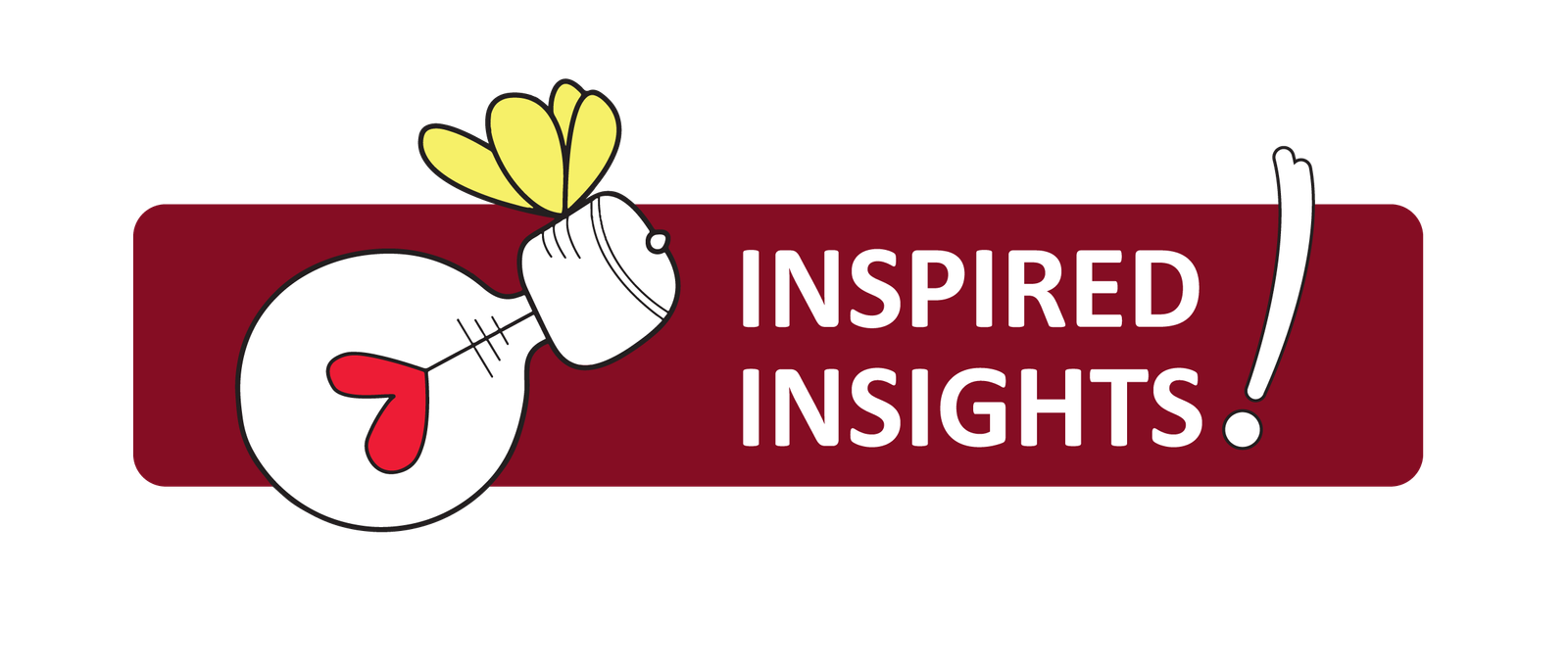
All Episodes
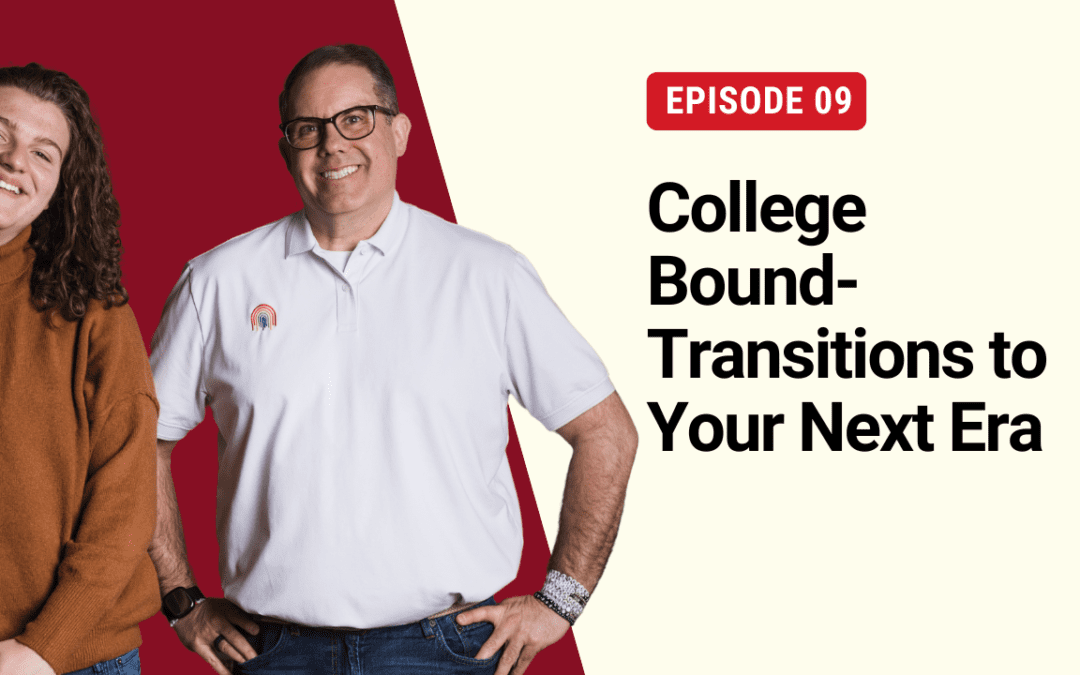
S3E9: College Bound: Transitions to Your Next Era
Soren and Chris sit down with two student life experts, Angela and Andi, to explore the powerful transition from high school to college—and how it reshapes community, mental health, identity, and daily life.
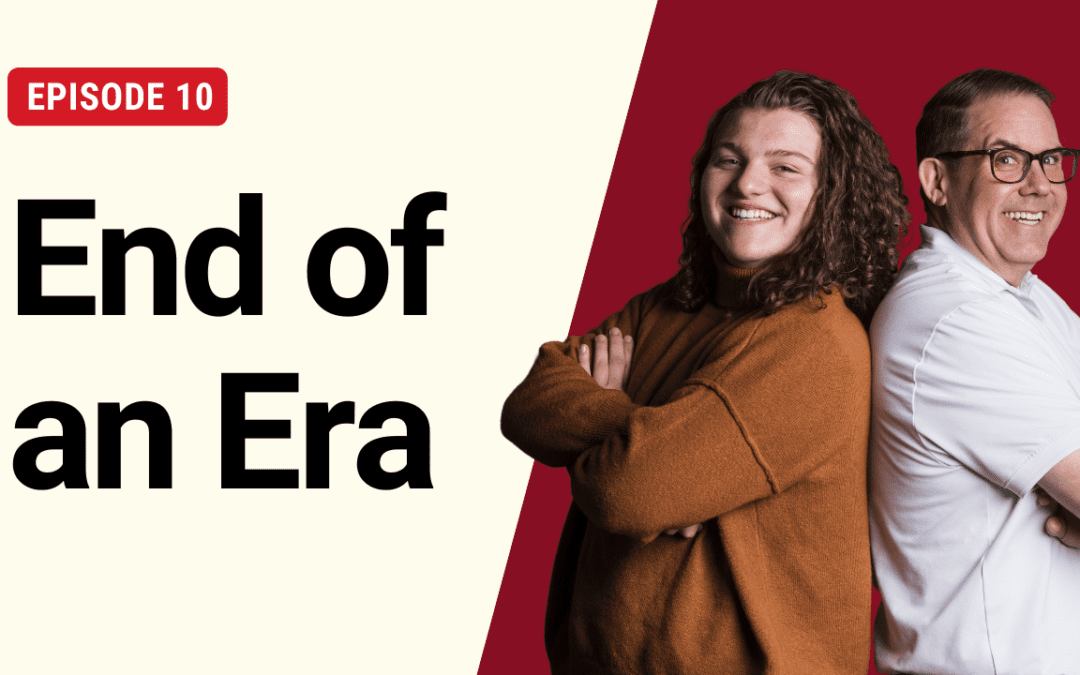
S3E10: End of an Era
Chris and Soren sit down in front of a studio audience filled with family, friends, and past guests to reflect on three seasons and 30 powerful episodes of storytelling, vulnerability, and intergenerational insight.
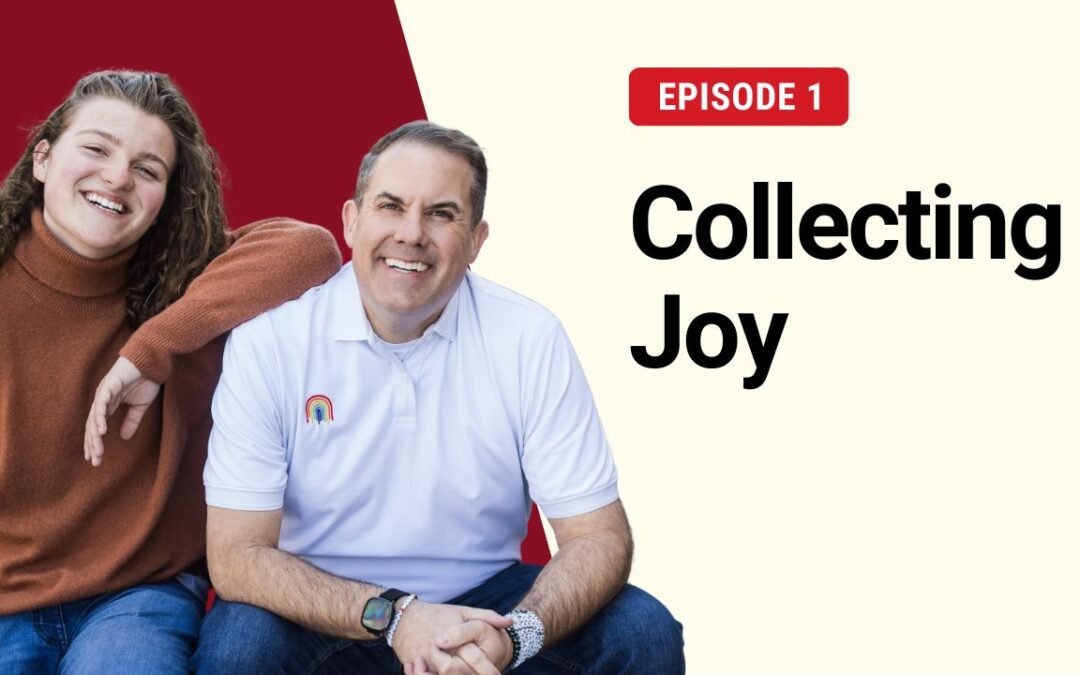
S2E1: Collecting Joy
The start of Season 2 is here! In our premiere episode, Chris and Soren explore the pursuit of happiness through the intentional collection of joy.
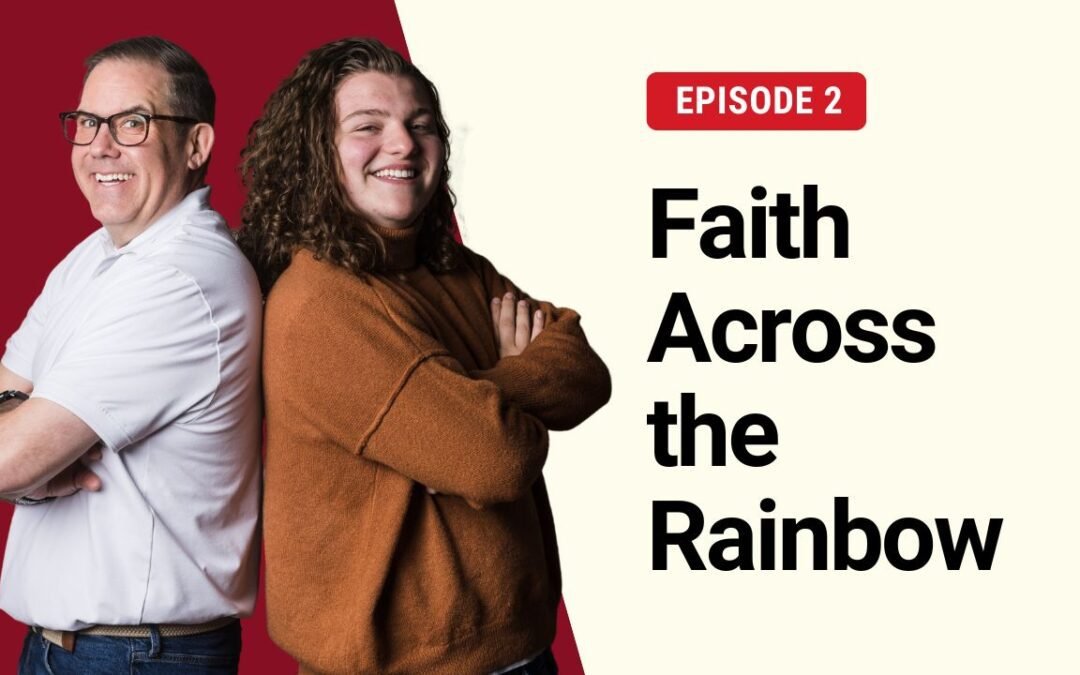
S2E2: Faith Across the Rainbow
Join our guest, chaplain and clinician, Greg Bridges-Music, as he talks with Chris and Soren about navigating the intricate relationship between spirituality and LGBTQ+ identities.

S2E3: Sequins and Smiles
Dive into the vibrant world of drag as Maine’s local drag performer, Dominick Varney, shares personal stories and insights on embodying Queer Joy through the art of drag.
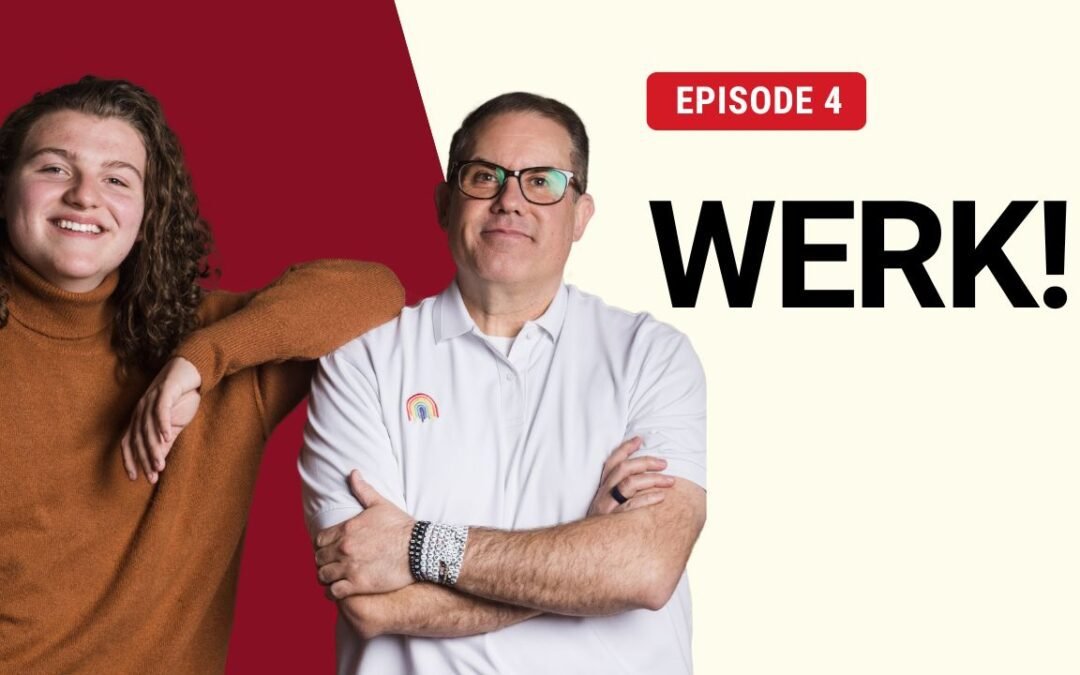
S2E4: WERK!
This discussion highlights how attitudes towards careers, workplace culture, and work-life balance have shifted over time.
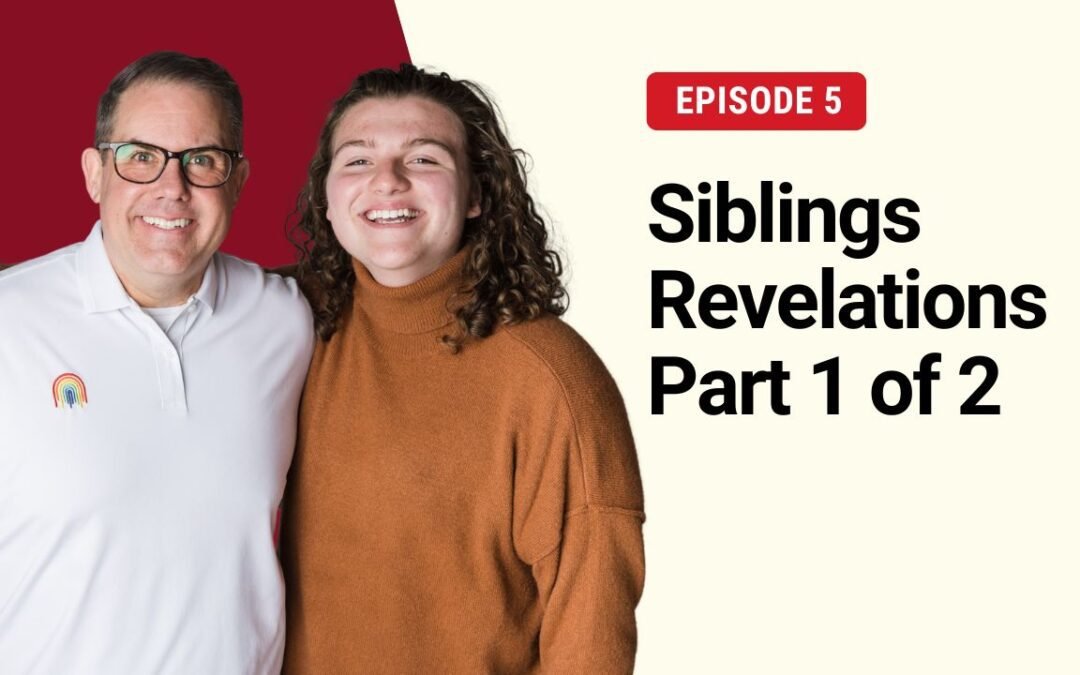
S2E5: Siblings Revelations Part 1 of 2
In this 2-part episode, Chris and Soren are joined by their two younger brothers to discuss the unique experiences and valuable lessons learned from growing up with older queer siblings.
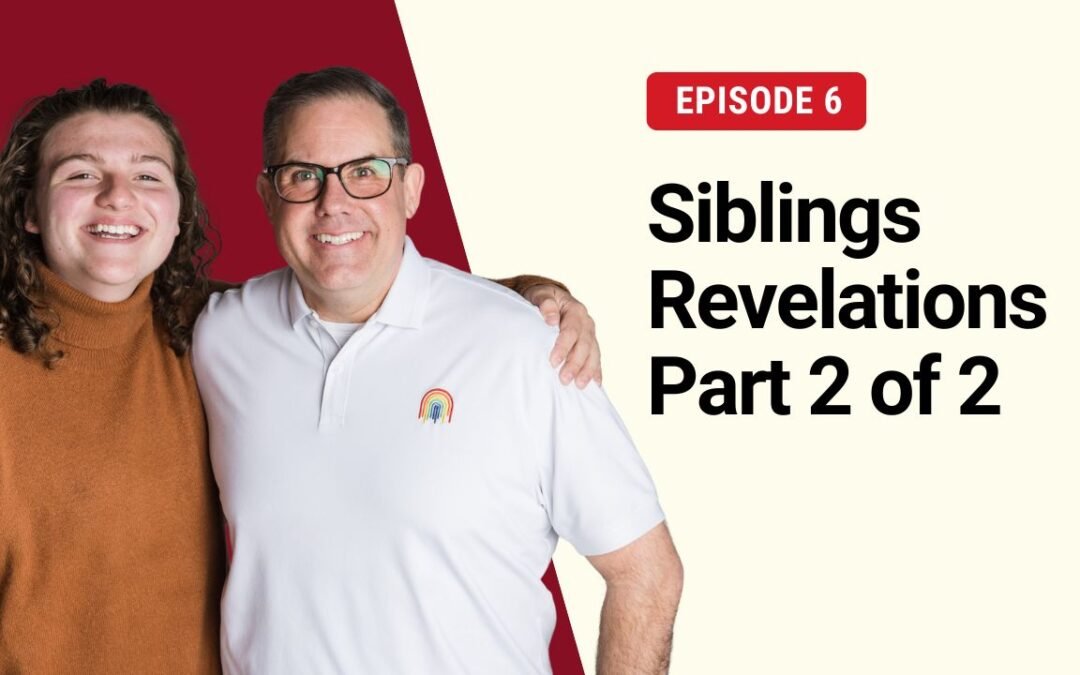
S2E6: Siblings Revelations Part 2 of 2
In this 2-part episode, Chris and Soren are joined by their two younger brothers to discuss the unique experiences and valuable lessons learned from growing up with older queer siblings.
